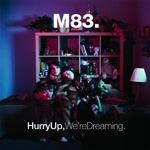
M83 Hurry Up, We're Dreaming
(Mute)
M83 is known for being epic, something double albums are almost always trying to be. M83 albums always sound huge and expansive, and if anyone can effectively use the oft-bloated double album platform effectively it’s him. Anthony Gonzales, the man behind the music, made the wise choice to make it a double album that could’ve fit on one disc. It doesn’t necessarily require the extra space, but it certainly deserves it. Adding the second disc makes Hurry Up, Were Dreaming sound like even more expansive and epic than it already is. It also makes it feel long, and it can be a lot to take in all at once.
Each M83 album takes on a life of its own, and each explores very specific themes very cohesively. Dead Cities, Red Seas and Lost Ghosts was dark, eerie and surreal, using heavy shoegaze intercut with ambient interludes. Before The Dawn Heals Us was unabashedly brash, with a similar tone to Dead Cities. Saturdays=Youth was a sharp turn into twee, and was both a fine moment and an irritating one. On one hand it was a beautiful trip in a new direction, but on the other it was annoyingly coy. Hurry Up, Were Dreaming attempts to combine the successes of all his previous work, and it works more often than not.
It opens with the chills-inducing but blandly titled Intro, which features Zola Jesus on vocals. It’s the first of many surprisingly catchy tunes, and sets the bar high for the rest of the first disc. Midnight City sets it even higher. The opening riff is one of the best bits of music to appear on any of his records. The entire song demands attention. That can be said for the entire record, really. Even the soft interludes sound meticulously layered and well put together. The gorgeous Wait ends with a cascade of textures and drums, something that must have taken weeks to assemble. The bizarre but oddly enjoyable Raconte-Moi Une Histoire tells an odd story about getting high off of frogs. It continues the surrealistic, dreamlike feel of the record well, but falls into the annoyingly coy path that occasionally inflicted Saturdays. Once the story ends, the song is among the prettiest on the album. The disc closes with five more excellent songs, the bassy Claudia Lewis, the fast paced This Bright Flash (which strongly recalls Dead Cities), and the closing orchestral flourishes of When Will You Come Home? and Soon My Friend.
My Tears Are Becoming A Sea opens disc two, again setting the bar high. It separates the first and second discs quite well, and defines them as two different but related entities. The second disc sounds more like the work in the first half of his career, but incorporates more live instrumentation than it used to. It’s just as dense, but more fluid and lifelike. The half is just as strong as the first, and is different enough to avoid getting dull. It’s far easier to absorb if not listened to immediately after the first. The records complement one another nicely.
While the album may explore all the sounds he’s used on previous albums successfully, that sees a drawback in its lack of cohesion compared to his other work. The overall emotion of the album isn’t nearly as strong as it could have been if there was more of a stylistic focus. The length makes that difficult to achieve. The record needs its length, but that in itself is a flaw. In the past, he’s effectively made his point without twenty-four songs. Here, I can’t think of a single song that could be removed. That points to the records strengths, but it also means it drags on and makes it seem bland by the end, when it’s really anything but.
Hurry Up, Were Dreaming may have its flaws, but it’s far from a disappointment. It’s an incredibly detailed, layered album. Gonzales has given us a lot to take in, but that’s exactly what we’ve come to expect from his albums. It’s livelier than his previous records, using more live instrumentation mixed in with his sweeping electronica. It’s a sweeping, expansive album, that covers a lot of ground and leaves the listener satisfied. Dead Cities and Before The Dawn Heals Us remain his best moments, but this fits in right behind them. Given the quality of those records, that’s no easy feat.
11 October, 2011 - 14:34 — Andrew Baer